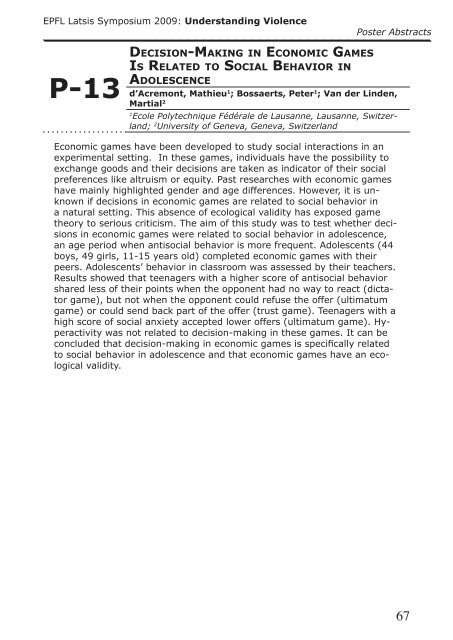Program & Abstract Book - EPFL Latsis Symposium 2009
Program & Abstract Book - EPFL Latsis Symposium 2009
Program & Abstract Book - EPFL Latsis Symposium 2009
Create successful ePaper yourself
Turn your PDF publications into a flip-book with our unique Google optimized e-Paper software.
<strong>EPFL</strong> <strong>Latsis</strong> <strong>Symposium</strong> <strong>2009</strong>: Understanding Violence<br />
P-13<br />
Decision-ma k i n g in ec o n o m i c ga m e s<br />
is re l a t e D t o so c i a l be h a v i o r in<br />
aD o l e s c e n c e<br />
Poster <strong>Abstract</strong>s<br />
d’Acremont, Mathieu 1 ; Bossaerts, Peter 1 ; Van der Linden,<br />
Martial 2<br />
1 Ecole Polytechnique Fédérale de Lausanne, Lausanne, Switzerland;<br />
2 University of Geneva, Geneva, Switzerland<br />
Economic games have been developed to study social interactions in an<br />
experimental setting. In these games, individuals have the possibility to<br />
exchange goods and their decisions are taken as indicator of their social<br />
preferences like altruism or equity. Past researches with economic games<br />
have mainly highlighted gender and age differences. However, it is unknown<br />
if decisions in economic games are related to social behavior in<br />
a natural setting. This absence of ecological validity has exposed game<br />
theory to serious criticism. The aim of this study was to test whether decisions<br />
in economic games were related to social behavior in adolescence,<br />
an age period when antisocial behavior is more frequent. Adolescents (44<br />
boys, 49 girls, 11-15 years old) completed economic games with their<br />
peers. Adolescents’ behavior in classroom was assessed by their teachers.<br />
Results showed that teenagers with a higher score of antisocial behavior<br />
shared less of their points when the opponent had no way to react (dictator<br />
game), but not when the opponent could refuse the offer (ultimatum<br />
game) or could send back part of the offer (trust game). Teenagers with a<br />
high score of social anxiety accepted lower offers (ultimatum game). Hyperactivity<br />
was not related to decision-making in these games. It can be<br />
concluded that decision-making in economic games is specifically related<br />
to social behavior in adolescence and that economic games have an ecological<br />
validity.<br />
67


